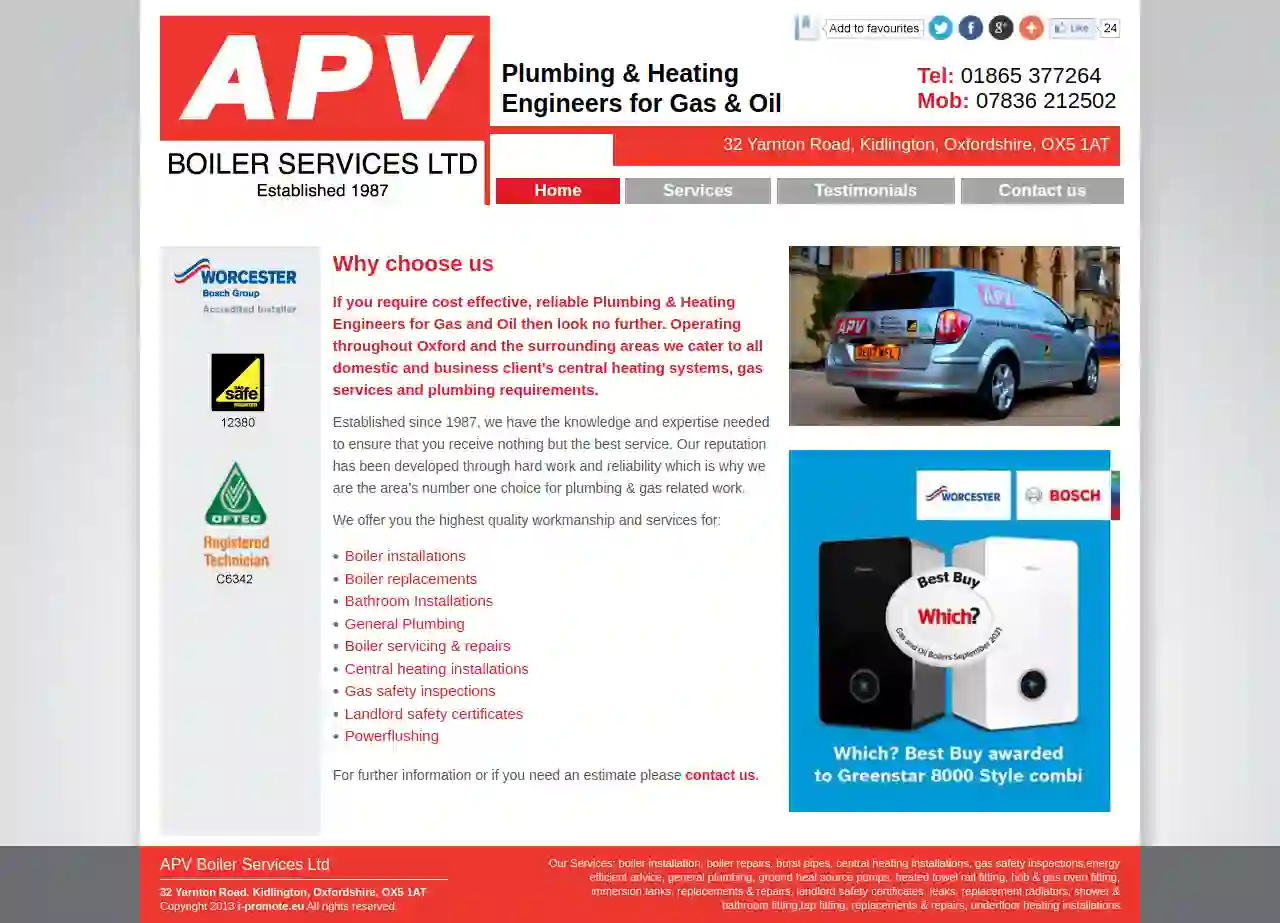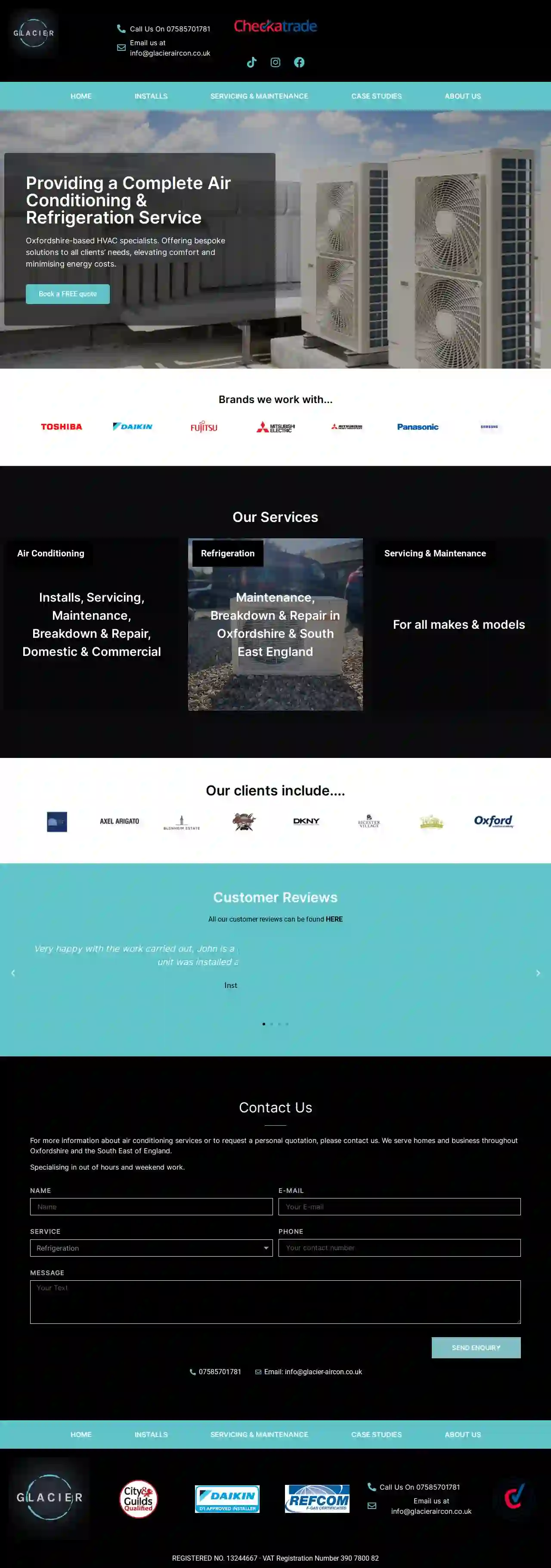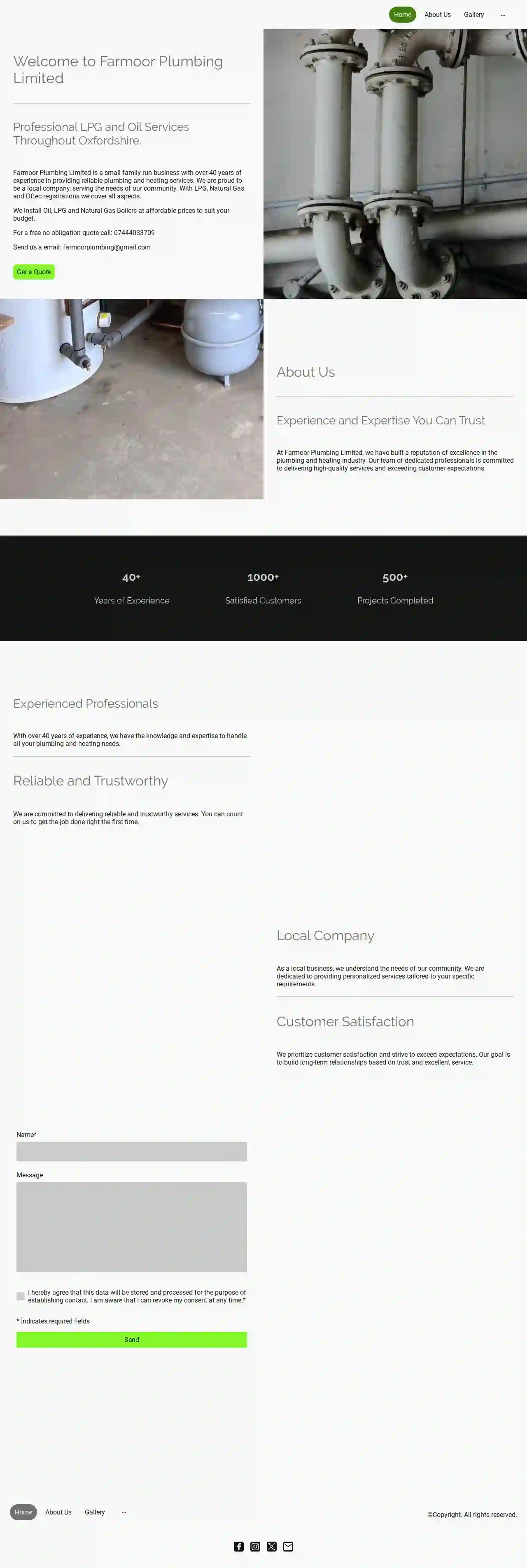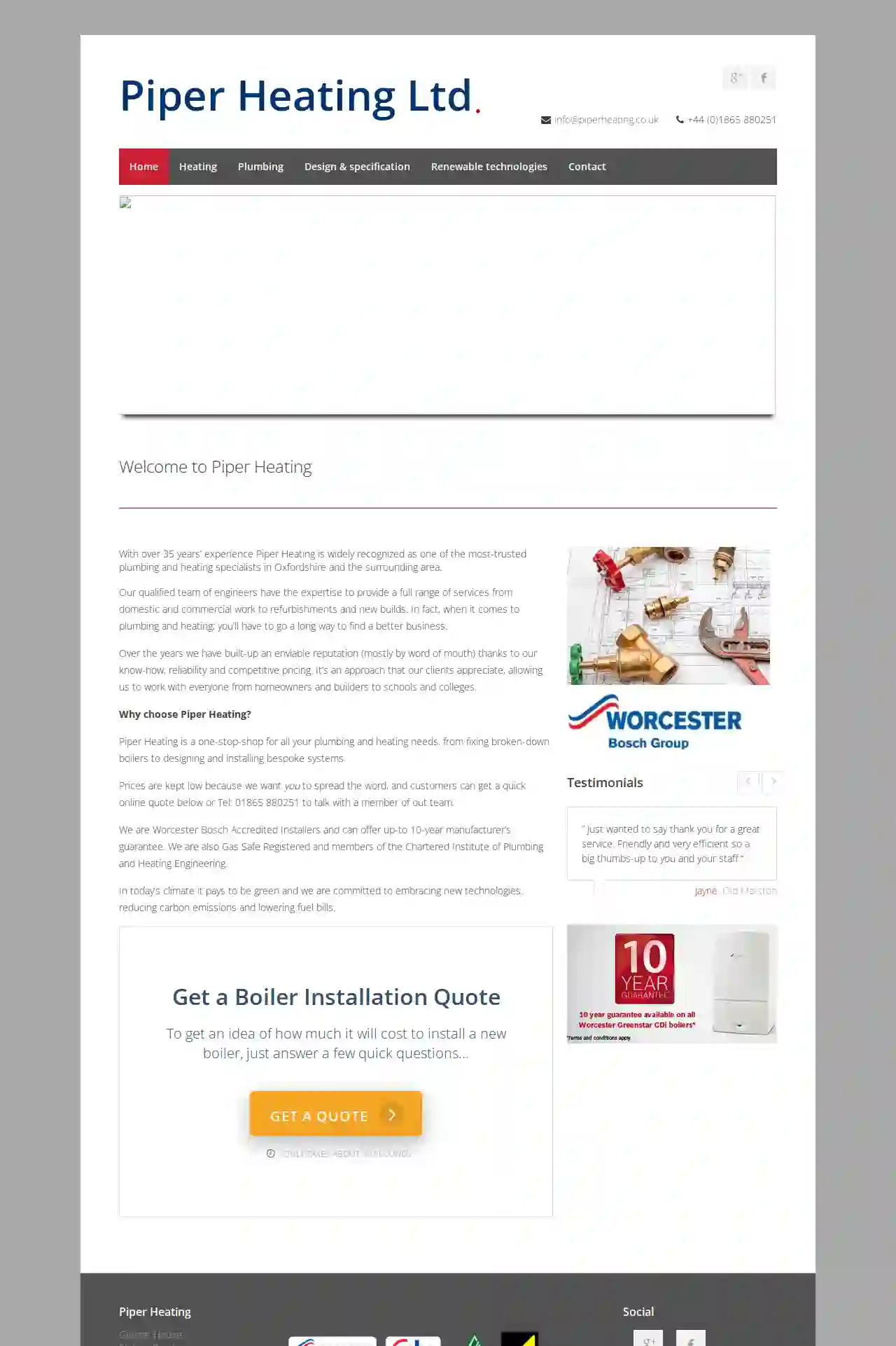AC Replacement Oxford
Top New AC Unit in Oxford
Receive multiple Central Air Replacement quotes for your project today! Compare profiles, reviews, accreditations, portfolio, etc... and choose the best offer.

APV Boiler Services Ltd
4.317 reviews32 Yarnton Road, Kidlington, OX5 1AT, GBAPV Boiler Services Ltd is a reputable plumbing and heating engineers company operating in Oxford and surrounding areas. Established since 1987, we have the knowledge and expertise needed to ensure that you receive nothing but the best service. Our reputation has been developed through hard work and reliability, which is why we are the area's number one choice for plumbing & gas related work. We offer a wide range of services, including boiler installations, boiler replacements, bathroom installations, general plumbing, boiler servicing & repairs, central heating installations, gas safety inspections, landlord safety certificates, and powerflushing. Our team of experienced and helpful staff will always be happy to assist you. For a free estimate, please call us today on 01865 377264 or simply complete the form.
- Services
- Why Us?
- Accreditations
- Gallery
Get Quote
Cotswold Heating Services
55 reviewsCarterton, GBWelcome to the Cotswold Heating Services website. My name is Gavin Hudson, and I specialise in servicing and repairs for Gas, Oil & LPG boilers and heating systems with a high level of customer care and workmanship. Boiler & Heating services in Carterton, Oxfordshire and surrounding areas. We offer servicing for all gas, oil and LPG boilers and appliances. We also specialise in fault finding, diagnosis and repair of boilers, appliances and heating controls. As part of our service we also offer annual service reminders, and guarantee appointment times so you don’t have to stay in all day waiting. We are a Gas Safe registered business and install, service, repair and commission all makes of gas boilers, cookers, hobs, gas fires and water heaters. We are also registered with OFTEC to install, service, repair and commission oil boilers and to carry out oil tank installations. We have specialist knowledge and experience in servicing and repair of AGA and Rayburn cookers. We also provide a power flushing service, removing scale and sludge from central heating systems to improve efficiency. We offer domestic and commercial Landlord’s Gas Safety Certificates and domestic Landlord Oil Installation Safety Checks. We cover most of Oxfordshire and some areas of Gloucestershire.
- Services
- Why Us?
- Accreditations
- Our Team
- Gallery
Get Quote
ACREAIR
522 reviewsUnit C, Three Michaels Yard, Carterton Ind Est, Carterton, OX18 3EZ, GBWest Oxfordshire's premier Vehicle Air Conditioning Specialists A warm welcome awaits you when you visit ACRE Air A family-run business established in 1978 with a background in farm vehicles and specialist air conditioning systems, they now provide servicing for any vehicle with an air conditioning system, and/or refrigeration systems. ACRE have been car air conditioning specialists for over 40 years, and provide car air con services to the public, trade, local garages and main dealers. Recharge your Vehicle We offer vehicle recharge and re-gassing services in our brand-new workshop Parts & Accessories available Contact us for our full range of dyes and high-performance oils and components Anti-Bacterial & Odour Removal Treatment removes the bacteria in the system and leaves it smelling fresh and clean Leak Detection and Diagnosis Ask about our free check and diagnostic service Now in New Premises! Don't worry, we've moved into a great new space next door. You get a relaxing place to wait while your vehicle gets the five star treatment. ACRE Air service all types of machinery with air conditioning units. The R1234yf gas is not available anywhere else locally! AIR-CON for… Cars At ACRE Air we offer both R134a and the newer R1234yf gases. Ask about our Anti-Bacterial & Odour Removal Treatment - perfect for air-conditioning systems over 3 years old. Say goodbye to stale, musty air! AIR-CON for… Agricultural Machinery Recharge Service Repair ACRE Air offers a mobile service for all agricultural air con needs. AIR-CON for… Commercial Plants We aim to keep your vehicle on the road and cooling efficiently, repairs booked to suit your work schedules. We cover both frigerated vehicles and plant equipment. What our customers say about ACRE Air… E. Smythe Highly recommended, extremely professional, fantastic value and we'll not be going anywhere else for Air Con based services in the future. Thanks Ian and Mandy! F. Sieczkowski Very good garage. Problem has been sorted out in a few minutes and now everything is working as it should. Good price. Strongly recommend. R. Brooks Air con in my car decided to stop working on what happened to be the hottest day of 2020 so far (30°). Phoned them up, dropped car off, picked up an hour later all sorted and great price. Excellent service. S. Merritt Ian diagnosed the problem with my BMW air conditioning very quickly. I booked the car in to have it repaired and it was finished before lunch time. Superb service, excellent knowledge and very professional. J. Booth Ian arrived earlier than expected. Totally professional / courteous / efficient and excellent value. Would recommend whole-heartedly ACRE Air. M. Fisher Fantastic place. Incredibly reasonable price for an AC regas and took their time to find any suspected leaks. Very happy indeed. J. Duncan Couldn't recommend enough. Quickly identified a leaking compressor, promptly fitted and up and running. If anything, car is super cold on a hot sunny day now if that was ever a problem :) Fast and effective communication throughout and sensible prices. Get in touch with ACRE Air We are open Monday to Friday : 8.30am – 5.30pm (Saturday – By Appointment) Visit Unit C, Three Michaels Yard, Carterton Ind Est, Carterton OX18 3EZ Email [email protected] Call 01993 841810 Unit C, Three Michaels Yard Carterton Ind Est Carterton OX18 3EZ © Copyright 2024. All Rights Reserved West Oxfordshire's premier Vehicle Air Conditioning Specialists site by treaclesponge
- Services
- Why Us?
- Our Team
- Testimonials
- Gallery
Get Quote
Central Heating Maintenance (Oxfordshire) Ltd
4.38 reviewsOxford, GBCentral Heating Maintenance Oxfordshire was started in 2010 by Alex Barnard. Alex is a Gas Safe-registered Heating Engineer with more than 20 years experience, specialising in gas boiler service, repair and replacement. If you live in Carterton, Witney, Oxford, the Cotswolds or the surrounding area and you’re having trouble with your heating and hot water, we can help you. Central Heating Maintenance Oxfordshire provides the following services:Boiler servicing Landlord’s gas safety checks and certificates Fixing your broken boiler Boiler replacement Central Heating Power Flushing Service Magnetic Filter installation to protect your heating system Gas Safe Registered and Public Liability Insured up to £1,000,000.
- Services
- Why Us?
- Accreditations
- Our Team
- Testimonials
- Gallery
Get Quote
G & O Engineers
4.454 reviewsWitney, Oxfordshire, 1 Cotswold Business Park, OX29 0YB, GBG&O Engineers Ltd is a professional building and home maintenance services company based in Witney, Oxfordshire. We offer a wide range of services including heating, plumbing, electrical, and building works, as well as 24/7 emergency call-out service. Our team of specialist engineers and builders are fully qualified and well-versed in taking care of any size job, whether it be for a commercial or domestic property. We cater for both domestic and commercial clients and provide free no-obligation quotes for all our services. Our company is Gas Safe, Oftec, and Chas registered, and we take pride in being your one-stop solution to anything that might go wrong with your property.
- Services
- Why Us?
- Accreditations
- Testimonials
- Gallery
Get Quote
Oxon Energy Ltd
4.830 reviewsThe Old Stables, Valley Farm, Bix Bottom, Henley on Thames, Oxfordshire, RG9 6BJ, GBSince 2014, Oxon Energy has been providing renewable energy solutions to homes across Oxon, Berks, Bucks, Surrey, Hants & West London. We design, install, commission and maintain air source, ground source and water source heat pumps, underfloor heating, air conditioning/air to air heat pumps, MVHR, solar PV, EV car charging facilities and home battery storage - everything your home needs to go greener! Our team are experienced and qualified professionals who can provide you with personalised, energy efficient systems that help heat and power your home whilst reducing your carbon footprint without compromising your comfort. We are MCS, RECC, REFCOM and Trustmark accredited, meaning we comply with the highest standards of quality and care within our industry. We're also proud members of the Ground Source Heat Pump Association and the Heat Pump Federation, putting us at the forefront of developments and innovation in heat pump technology. As a multi award-winning company, we pride ourselves on offering exceptional customer service and aftercare. Our commitment to approved quality management schemes means that we can help you to benefit from grants such as Ofgem’s Boiler Upgrade Scheme, or the banking industry’s own greener homes grants and loans. We can help you to access any funding for which you are eligible and ensure your system is as efficient as it can be - because we believe energy shouldn’t cost the earth.
- Services
- Why Us?
- Accreditations
- Our Team
- Testimonials
- Gallery
Get Quote
Glacier Air Conditioning Ltd.
510 reviewsOxford, GBOxfordshire-based HVAC specialists. Offering bespoke solutions to all clients’ needs, elevating comfort and minimising energy costs. Providing a Complete Air Conditioning & Refrigeration Service.
- Services
- Why Us?
- Testimonials
- Gallery
Get Quote
Farmoor Plumbing Limited
55 reviewsOxford, GBWelcome to Farmoor Plumbing Limited, a small family-run business with over 40 years of experience in providing reliable plumbing and heating services throughout Oxfordshire. We take pride in being a local company, dedicated to serving the needs of our community. With our LPG, Natural Gas, and Oftec registrations, we cover all aspects of your plumbing and heating requirements. We install Oil, LPG, and Natural Gas Boilers at affordable prices to suit your budget. For a free, no-obligation quote, call us at 07444033709 or send an email to [email protected]. At Farmoor Plumbing Limited, we have built a reputation for excellence in the plumbing and heating industry. Our team of dedicated professionals is committed to delivering high-quality services and exceeding customer expectations. With over 40 years of experience, we possess the knowledge and expertise to handle all your plumbing and heating needs. We are committed to providing reliable and trustworthy services, ensuring the job is done right the first time. As a local business, we understand the unique needs of our community and strive to provide personalized services tailored to your specific requirements. Customer satisfaction is our top priority, and we aim to build long-term relationships based on trust and exceptional service.
- Services
- Why Us?
- Gallery
Get Quote
Oxford Refrigeration & Air Conditioning Ltd
32 reviewsOxford, GBOxford Refrigeration and Air Conditioning Specialists in the installation, maintenance and servicing of refrigeration, air conditioning, plumbing and ventilation systems. For Commercial and Industry Give your business an ORAC service Commercial and Industrial services For Residential Improve your comfort at home with our services Residential Services 0% VAT on residential heat pumps Our Services Commercial and Residential services All services Air Conditioning and Heating more Refrigeration more Service and Maintenence more Plumbing and Ventilation more Our Projects See our work in action See all projects Air conditioning and heating Chiller Replacement Air conditioning and heating New Install For A Customer Near Eynsham Air conditioning and heating Headington School Library recently completed Air conditioning and heating New Installation Completed In Headington Air conditioning and heating New Installation Completed Near Thame Air conditioning and heating New Installation Completed at a High-end Residential Property in London Air conditioning and heating New Installation Completed at Cumnor Hill, Oxford Air conditioning and heating New Installation Completed At A&A Hairdressers Air conditioning and heating New Installation Completed for City of Oxford College Air conditioning and heating New Installation Completed at Oxford Technology Park Air conditioning and heating New Installation at Exeter College, Oxford Air conditioning and heating New Installation Completed at Baton Restaurant Air conditioning and heating New Installation Completed at Oxford University Estates Department Offices Refrigeration Replacement water chillers Air conditioning and heating Installation of air conditioning at a flag ship hotel Air conditioning and heating Heat pump air conditioning design and installation for a garden office Air conditioning and heating Design and Installation of our services at Heyford Park Air conditioning and heating Our services provided for Oxford laboratory equipment manufacturer Air conditioning and heating Maintenance contract at a Oxford-based Pharmaceutical Company Air conditioning and heating Replacement of R22 air conditioning systems Looking for a new air conditioning unit Feel free to use our price calculator to get an idea of how much your project could cost based on your requirements Pricing calculator TRADE ASSOCIATIONS Latest Insights, opinions and advice See all news Commercial and Industrial Safewell Ltd and Oxford Refrigeration Residential New service and maintenance package Commercial and Industrial Asbestos Awareness Residential SAFEcontrator approved Book a free survey Enjoy a free survey and receive expert advice on your residencial or commercial’s needs Book a Survey Services Why ORAC Case Studies Latest Contact Privacy and Policy Credit account application Purchase T&Cs Conditions of Supply © 2024 Orac Oxford Ltd. Oxford All rights reserved. Bespoke website by mwb-agency.com We use cookies and other tracking technologies to improve your browsing experience on our website, to analyse our website traffic, and to understand where our visitors are coming from. I accept I don't accept Learn more
- Services
- Why Us?
- Gallery
Get Quote
Piper Heating Ltd
53 reviewsStation Road, Grange House, Eynsham, OX29 4HX, GBWelcome to Piper Heating Ltd, a trusted plumbing and heating specialist in Oxfordshire and the surrounding area. With over 35 years' experience, our qualified team of engineers provide a full range of services from domestic and commercial work to refurbishments and new builds. We've built an enviable reputation through our know-how, reliability, and competitive pricing, making us a one-stop-shop for all your plumbing and heating needs.
- Services
- Why Us?
- Accreditations
- Testimonials
- Gallery
Get Quote
Over 1,991+ HVAC Companies on our platform
Our HVAC companies operate in Oxford and surrounding areas!
HVACCompaniesHub has curated and vetted Top HVAC Contractors near Oxford. Find a top & trustworthy business today.
Frequently Asked Questions about AC Replacement
- Turn off the AC at the thermostat.
- Locate the circuit breaker that controls your AC unit and turn it off.
- Wait at least 5 minutes for the system to completely power down.
- Turn the circuit breaker back on.
- Turn on the AC at the thermostat.
- Regular Maintenance: Clean or replace your air filters every 1-3 months and keep the area around your outdoor unit free of debris.
- Upgrade to a High-SEER Unit: If your AC is old, consider replacing it with an Energy Star certified unit with a high SEER rating.
- Programmable Thermostat: Use a programmable or smart thermostat to optimize temperature settings and reduce energy consumption when you're away or asleep.
- Seal Air Leaks: Seal air leaks around windows, doors, and other openings to prevent cool air from escaping.
- Improve Insulation: Add insulation to your attic, walls, and floors to reduce heat transfer and improve your home's energy efficiency.
- Use Window Coverings: Close curtains or blinds during the day to block out sunlight and prevent heat gain.
- Zone Your HVAC System: If you have rooms that are rarely used or require different temperatures, consider zoning your system to avoid wasting energy specific areas.
- Central AC Units: These systems use ductwork to distribute cooled air throughout the entire home or building. They are a common choice for larger homes or commercial properties.
- Ductless Mini-Splits: Ductless mini-splits are a good solution for homes and buildings without existing ductwork.. They allow for personalized comfort levels.
- Window AC Units: These units are designed to cool individual rooms and fit into a standard window. They are relatively inexpensive but lack the efficiency and quiet operation of other models.
- Portable AC Units: Portable AC units can be moved from room to room. They require a window for venting.
- Heat Pumps: Heat pumps provide both heating and cooling, using heat from the air to provide year-round comfort. Heat pumps are ideal for climates with mild winters.
- Geothermal Heat Pumps: Geothermal heat pumps use the constant temperature of the earth for highly efficient heating and cooling. While they can be expensive to install due to the ground loop requirements, they provide significant long-term energy savings and environmental benefits.
How do I reset my AC unit?
How can I make my air conditioner more energy efficient?
What is an Energy Star certified AC unit?
What are the different types of AC units?
How do I reset my AC unit?
- Turn off the AC at the thermostat.
- Locate the circuit breaker that controls your AC unit and turn it off.
- Wait at least 5 minutes for the system to completely power down.
- Turn the circuit breaker back on.
- Turn on the AC at the thermostat.
How can I make my air conditioner more energy efficient?
- Regular Maintenance: Clean or replace your air filters every 1-3 months and keep the area around your outdoor unit free of debris.
- Upgrade to a High-SEER Unit: If your AC is old, consider replacing it with an Energy Star certified unit with a high SEER rating.
- Programmable Thermostat: Use a programmable or smart thermostat to optimize temperature settings and reduce energy consumption when you're away or asleep.
- Seal Air Leaks: Seal air leaks around windows, doors, and other openings to prevent cool air from escaping.
- Improve Insulation: Add insulation to your attic, walls, and floors to reduce heat transfer and improve your home's energy efficiency.
- Use Window Coverings: Close curtains or blinds during the day to block out sunlight and prevent heat gain.
- Zone Your HVAC System: If you have rooms that are rarely used or require different temperatures, consider zoning your system to avoid wasting energy only the occupied spaces.
What is an Energy Star certified AC unit?
What are the different types of AC units?
- Central AC Units: These systems use ductwork to distribute cooled air throughout the entire home or building. They are a common choice for larger homes or commercial properties.
- Ductless Mini-Splits: Ductless mini-splits provide zoned cooling to individual rooms. They allow for personalized comfort levels.
- Window AC Units: Good for small spaces or single rooms and are installed in a window opening. They are a budget-friendly option but lack the efficiency and quiet operation of other models.
- Portable AC Units: Portable AC units offer a flexible cooling solution for single rooms. They vent hot air out through a window exhaust hose and are typically less energy-efficient than other AC types..
- Heat Pumps: These systems provide both heating and cooling, using heat from the air to provide year-round comfort. Heat pumps are ideal for climates with mild winters.
- Geothermal Heat Pumps: Geothermal heat pumps use the constant temperature of the earth for highly efficient heating and cooling. While they can be expensive to install due to the ground loop requirements, they provide significant long-term energy savings and environmental benefits.